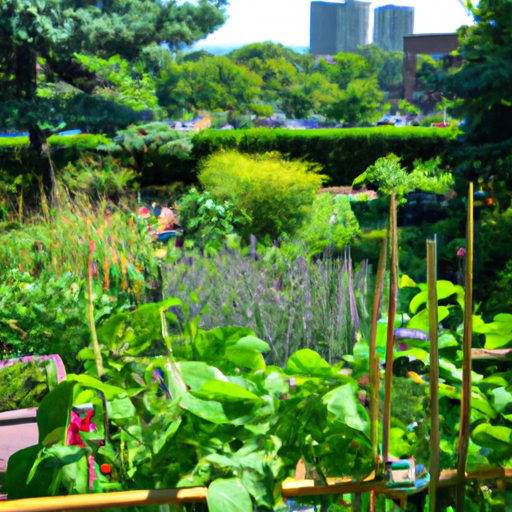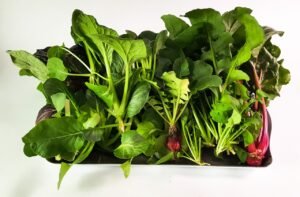
Living in a city may seem disconnected from the world of agriculture, but urban farming is proving to be a vital solution to the challenges of sustainable food production. With limited space and resources, urban farmers are finding innovative ways to grow fruits, vegetables, and herbs right in the midst of the concrete jungle. From rooftop gardens to vertical farming, these urban oases not only provide fresh and nutritious produce but also foster a sense of community and promote sustainable practices. In this article, we will explore the numerous benefits of urban farming and how it is shaping the future of agriculture in our cities.
Increasing Food Security
Addressing Food Deserts
Urban farming plays a crucial role in addressing the issue of food deserts, which are areas where access to fresh and nutritious food is limited or completely absent. By establishing community gardens or rooftop farms in these areas, you can provide residents with easy access to fresh produce. These initiatives not only increase food security but also empower individuals to take control of their own food supply.
Reducing Reliance on Imported Food
One of the benefits of urban farming is the ability to reduce reliance on imported food. By growing food locally, you can decrease transportation costs and the carbon footprint associated with long-distance shipping. Cultivating a diverse range of crops in urban areas ensures a more sustainable and resilient local food system.
Ensuring Fresh and Nutritious Produce
Urban farming allows for the cultivation of fresh and nutritious produce right in the heart of the city. With shorter distances between farm and table, urban farmers can harvest their crops when they are at peak ripeness, resulting in higher quality and more nutrient-dense produce. This not only benefits local residents by providing them with healthier food options but also helps to reduce food waste and spoilage.
Minimizing Environmental Impact
Reducing Food Miles
Urban farming significantly reduces food miles, which refers to the distance food travels from the farm to the consumer. By growing food in or near urban areas, the need for long-distance transportation is greatly reduced. This translates to decreased greenhouse gas emissions, lower fuel consumption, and a smaller carbon footprint. By minimizing food miles, urban farming helps mitigate climate change and contributes to a more sustainable future.
Conserving Water and Soil
Efficient water management is an essential aspect of urban farming. Through innovative techniques such as hydroponics and drip irrigation, water usage can be reduced compared to traditional farming methods. Additionally, urban farming promotes the use of compost and organic fertilizers, improving soil quality and reducing the need for synthetic chemicals. These practices help conserve precious resources, protect watersheds, and promote soil health.
Mitigating Air Pollution
Traditional agriculture often relies on heavy machinery, which contributes to air pollution and greenhouse gas emissions. In contrast, urban farming minimizes the use of such machinery, leading to reduced air pollution in urban areas. With a focus on sustainable and regenerative practices, urban farming can play a significant role in improving air quality and creating a healthier urban environment for all residents.
Promoting Community Engagement
Enhancing Food Literacy
Urban farming provides an excellent opportunity to enhance food literacy and educate communities about sustainable agriculture. Through initiatives such as community gardening workshops and educational programs, individuals can learn about growing their own food, making healthier dietary choices, and understanding the importance of sustainable food systems. By fostering food literacy, urban farming empowers communities to make informed decisions about their food and promotes a more sustainable and resilient future.
Building Social Connections
Community gardens and urban farming initiatives foster social connections among individuals from diverse backgrounds. These spaces become communal gathering places where people can come together, share knowledge, and build relationships. By promoting cooperation and collaboration, urban farming strengthens community bonds and creates a sense of belonging and shared purpose.
Encouraging Active Lifestyles
Urban farming encourages active lifestyles by providing opportunities for physical activity and outdoor engagement. Whether it’s tending to a garden, participating in community workdays, or enjoying recreational activities in green spaces, urban farming promotes healthier and more active lifestyles. By integrating nature into urban environments, these initiatives contribute to the overall well-being of individuals and enhance their quality of life.
Creating Job Opportunities
Supporting Local Economy
Urban farming has the potential to create job opportunities and stimulate local economic development. From farm managers and technicians to marketing and distribution professionals, urban farming requires a diverse range of skills. By supporting local businesses and farmers, urban farming contributes to the growth of the local economy and provides employment opportunities for individuals within the community.
Fostering Entrepreneurship
Urban farming also fosters entrepreneurship by providing a platform for individuals to start their own businesses. Whether it’s cultivating specialty crops, supplying restaurants with fresh produce, or creating value-added products, urban farming allows entrepreneurs to tap into niche markets and contribute to the local economy. By nurturing entrepreneurship, urban farming empowers individuals to become self-reliant and contribute to the overall prosperity of their communities.
Providing Skill Development
Urban farming offers valuable skill development opportunities, particularly for marginalized communities or individuals with limited access to employment or educational resources. By providing training in areas such as agriculture, horticulture, and sustainable practices, urban farming equips individuals with practical skills and knowledge. These skills can then be applied not only in urban farming but also in other sectors, promoting personal and professional growth.
Utilizing Underutilized Spaces
Transforming Vacant Lots
Urban farming has the incredible potential to transform vacant lots into productive and vibrant spaces. Land that is otherwise neglected or abandoned can be repurposed for community gardens or urban farms, creating green oases in the midst of urban concrete. By utilizing these underutilized spaces, urban farming maximizes the potential of urban landscapes and brings life and vitality to forgotten areas.
Utilizing Rooftops and Balconies
With the growing trend of vertical gardening and container gardening, urban farming has expanded to rooftops and balconies. These previously unused spaces now offer opportunities for cultivating herbs, vegetables, and even small fruit trees. By utilizing rooftops and balconies, urban farming not only maximizes space but also enhances the aesthetic appeal of the cityscape.
Converting Industrial Areas into Farms
Urban farming has the potential to transform vacant or underused industrial areas into productive and sustainable farms. By repurposing these areas for agriculture, contaminated or degraded land can be remediated and put to productive use. This process not only provides fresh produce but also revitalizes urban areas and creates a more balanced and sustainable urban environment.
Improving Food Quality
Reducing Pesticide Use
One of the key benefits of urban farming is the ability to grow food using organic and sustainable practices. By implementing integrated pest management techniques, urban farmers can reduce or eliminate the use of synthetic pesticides. This not only promotes healthier and safer food but also protects the environment, conserves beneficial insects, and supports biodiversity.
Offering Organic and Local Options
Urban farming allows consumers to access a wide range of organic and locally grown options. By reducing the distance between farm and table, urban farmers are able to deliver fresher produce that is free from chemical additives or preservatives. Additionally, by supporting local farmers and businesses, urban farming promotes a sense of community and strengthens the local food system.
Enhancing Flavor and Nutrient Density
Freshly harvested produce from urban farms often surpasses its commercially grown counterparts in terms of flavor and nutrient density. With the ability to harvest crops when they are perfectly ripe and at their peak nutritional value, urban farmers can offer produce that is bursting with flavor and packed with essential vitamins and minerals. This not only enhances the culinary experience but also contributes to a healthier diet for urban dwellers.
Preserving Biodiversity
Conserving Native Plants and Seeds
Urban farming plays a significant role in conserving native plants and seeds, which are vital for maintaining biodiversity. By incorporating local and heirloom varieties into their growing practices, urban farmers help preserve traditional crops and prevent the loss of genetic diversity. Furthermore, urban farming initiatives often create habitats for native plants, contributing to the overall health and resilience of urban ecosystems.
Supporting Pollinators
Urban farming provides essential habitat and food sources for pollinators such as bees and butterflies. By cultivating pollinator-friendly plants and incorporating pollinator habitats into urban landscapes, urban farmers play a critical role in supporting these essential species. This, in turn, contributes to the continued pollination of plants, ensuring a reliable food supply for both humans and wildlife.
Protecting Ecosystems
Urban farming initiatives that prioritize sustainable and regenerative practices are instrumental in protecting urban ecosystems. By reducing the use of pesticides, promoting biodiversity, and conserving water and soil, urban farming minimizes negative impacts on local ecosystems. In doing so, it helps maintain a healthy balance between urban development and the natural environment, ensuring a sustainable future for both humans and wildlife.
Enhancing Urban Aesthetics
Creating Greener and More Beautiful Cities
Urban farming adds a touch of greenery and natural beauty to urban landscapes. By transforming vacant lots, rooftops, and other underutilized spaces into lush gardens or farms, urban farming enhances the visual appeal of cities. This green infrastructure not only has aesthetic benefits but also helps reduce heat island effects, improves air quality, and creates a more pleasant and welcoming urban environment for residents and visitors alike.
Adding Natural Elements to Urban Areas
In addition to traditional farming practices, urban farming often incorporates natural elements such as vertical gardens, living walls, and water features. These elements bring nature into urban areas, creating a harmonious blend of urban and natural environments. By integrating such features, urban farming helps create a sense of tranquility and promotes mental and emotional well-being among city dwellers.
Enhancing Quality of Life
By contributing to the overall beauty and aesthetics of cities, urban farming enhances the quality of life for urban residents. Access to green spaces and natural environments has been shown to have positive effects on mental health, stress reduction, and overall well-being. Urban farming initiatives provide residents with areas for relaxation, recreation, and connection with nature, contributing to a happier and healthier urban lifestyle.
Contributing to Climate Change Mitigation
Carbon Sequestration
Urban farming plays a role in mitigating climate change by sequestering carbon dioxide from the atmosphere. Plants absorb carbon dioxide during photosynthesis, effectively capturing this greenhouse gas and storing it as organic matter in their biomass and the soil. By increasing vegetation cover in urban areas, urban farming helps remove carbon dioxide from the air, reducing the concentration of greenhouse gases and their impact on the climate.
Reducing Food Waste
Food waste is a significant contributor to greenhouse gas emissions. However, urban farming can help combat this issue by minimizing food waste at the source. By growing food locally, selling directly to consumers, and implementing efficient harvesting and distribution practices, urban farmers can significantly reduce the amount of food that goes to waste. This not only reduces greenhouse gas emissions but also addresses the broader issue of food insecurity.
Promoting Sustainable Agricultural Practices
Urban farming promotes sustainable agricultural practices such as organic farming, composting, and water conservation. These practices minimize the use of synthetic inputs, conserve natural resources, and build soil health. By showcasing these sustainable practices in urban environments, urban farming serves as a model for the broader agricultural industry and encourages the adoption of more sustainable and environmentally friendly practices.
Providing Educational Opportunities
Teaching Sustainable Practices
Urban farming offers numerous educational opportunities, particularly in teaching sustainable agricultural practices. Through workshops, demonstrations, and educational programs, urban farms educate individuals about concepts such as organic farming, composting, and water conservation. By fostering an understanding of sustainable practices, urban farming not only promotes individual knowledge but also creates a more informed and environmentally conscious society.
Encouraging Science and Agriculture Education
Urban farming provides a unique platform for science and agriculture education in urban environments. By engaging with schools, colleges, and community organizations, urban farming initiatives can offer hands-on learning experiences for students of all ages. These opportunities allow individuals to explore subjects such as botany, biology, and environmental science while gaining practical knowledge about food production and sustainable agriculture.
Promoting Lifelong Learning
One of the lasting benefits of urban farming is the promotion of lifelong learning. By providing ongoing educational programs, urban farms create spaces where individuals can continue to expand their knowledge and skills. Whether it’s attending workshops on advanced gardening techniques or learning about the latest innovations in sustainable agriculture, urban farming promotes a culture of continuous learning and personal growth.
In conclusion, urban farming offers numerous benefits that address a wide range of environmental, social, economic, and educational concerns. From increasing food security and minimizing environmental impact to promoting community engagement and contributing to climate change mitigation, urban farming serves as a sustainable solution to many pressing challenges. By embracing urban farming initiatives, communities can create more resilient, vibrant, and livable cities, fostering a healthier and more sustainable future for all.







